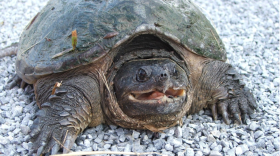
Sitting Bull to Phil Jackson, cattle to prairie dogs, knoephla to lefse. North Dakota's legacy includes many strange stories of eccentric towns, war heroes, and various colorful characters. Hear all about them on Dakota Datebook, your daily dose of North Dakota history.
—
Dakota Datebook is made in partnership with the State Historical Society of North Dakota, and funded by Humanities North Dakota, a nonprofit, independent state partner of the National Endowment for the Humanities. Any views, findings, conclusions, or recommendations expressed in the program do not necessarily reflect those of Humanities North Dakota or the National Endowment for the Humanities.
You can find all Dakota Datebooks from 2018-today below. Our archive of Datebooks from 2003-2017 can be found here.
-
In this episode of Dakota Datebook, we'll listen to Mary Bateman, enrolled member of the Mandan Hidatsa Arikara Nation, as she talks about living off the land.
-
The American West underwent major changes in the early 1900s. Cities and towns were springing up, railroads crisscrossed the countryside, and fences put land off-limits to public use. The Federal government also established Forest Reserves. Grazing livestock in these areas required a permit. In an effort to avoid paying for permits, some livestock owners moved their herds from place to place in search of grazing and water. This was common for sheepherders.
-
May is National Historic Preservation Month, and today we hear about another historic structure involved with North Dakota’s transportation infrastructure.
-
In this episode of Dakota Datebook, we'll listen to Catherine Froelich, enrolled member of the Mandan, Hidatsa, and Arikara Nation, in part two of Getting Through Boarding School.
-
On this date in 1931, an F3 tornado collided with the Empire Builder passenger train, the pride of the Great Northern Railway. The train had just left Fargo, heading east on a hot afternoon. The engineer and several passengers saw a small funnel cloud to the southwest. The funnel bobbed up and down; then the top of a haystack blew apart. Seconds later, the train shook and the windows blew out in several cars.
-
In this episode of Dakota Datebook, we'll listen to Katherine Froelich, enrolled member of the Mandan Hidatsa and Arikara Nation in Part One of "Getting Through Boarding School."
-
The United States is home to more turtle species than any other country in the world, with almost one hundred species and subspecies. North Dakota has four native species. All four have healthy populations and are classified as “least concern” on the scale of conservation status.
-
On this date in 1917, the North Dakota attorney general’s office made a shocking announcement. An arrest warrant had been issued for the president of the Soo Line Railroad, Edmund Pennington, for bringing liquor into the state. The assistant attorney general said immense quantities of liquor had been shipped to illegal clubs, blind pigs, and bawdy houses.
-
On this date in 1927, the Dakota Student, UND’s student newspaper, printed an article about a paradise proposed by the university's dean of engineering.
-
History is all around us, if only we open our eyes to see it, and sometimes get off the main highways and find it. One such historical gem is in McVille, in Nelson County. It’s the McVille Auditorium, a reminder of the 1930s Great Depression-era.
Dakota Datebook is made in partnership with the State Historical Society of North Dakota, and funded by Humanities North Dakota, a nonprofit, independent state partner of the National Endowment for the Humanities.
Any views, findings, conclusions, or recommendations expressed in the program do not necessarily reflect those of Humanities North Dakota or the National Endowment for the Humanities.


